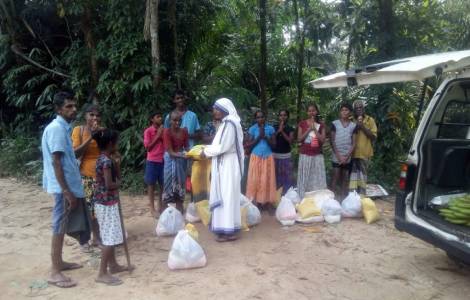
Caritas Sri Lanka
Colombo (Agenzia Fides) - Sri Lanka is on the way out of the worst economic crisis in decades that hit the country last year when its foreign exchange reserves ran out and the country went into default. The drastic measures taken by the government included import restrictions on more than 3,200 items, while it recently lifted import restrictions on 286 items. Over the past nine months, financial conditions have improved and the economy has regained some stability, thanks to the $2.9 billion rescue loan from the International Monetary Fund (IMF), which has helped ease inflation (after an initial surge), while the country has started to rebuild its foreign exchange reserves, also thanks to the recovery in tourism revenues. Despite the easing of the crisis, the country needs to complete debt negotiations with creditors by September and implement important economic reforms to put the recovery on a sustainable path. According to IMF projections, Sri Lanka's economy will contract by 3% in 2023 after contracting by 7.8% in 2022 and a return to growth is expected in 2024.
The national director of the Pontifical Mission Societies on the island of the Indian subcontinent, Fr. Basil Rohan Fernando, priest of the Archdiocese of Colombo, tells Fides how the population of Sri Lanka is experiencing this phase of tentative recovery: "After a very difficult year", he stresses, "analysts are now talking about a trend of improvement, thanks to international aid. But we still suffer from the problem of political instability and a President who has no legitimacy among the population. In addition, this change has not yet had direct effects on people's lives, given the essential consumer goods are still at very high prices, which puts thousands of families in difficulty. For example, the cost of electricity has risen 200% since last year and continues unabated. The loss of jobs and the high unemployment remains widespread and families are struggling to survive".
In this situation of extreme need, adds the Director, "it must be said that we are witnessing a strong return to God, especially in times of trial and suffering, people flock to churches, where they find material and spiritual comfort. Above all, the faithful seek spiritual nourishment, while the poorest also receive material help". "Some Catholic parishes are also experiencing difficulties, as the faithful's donations to support pastoral life have decreased or stopped altogether due to the economic crisis. And therefore a spontaneous movement has also taken place among Catholic communities and parishes of mutual aid and solidarity," he notes.
In this phase, the priest concludes, “the work of Caritas and other voluntary associations and congregations that organize support for the poorest, the loneliest and the needy is always active and present. Every church is a place where food is also offered and the needy fed. Every church and every community that stretches out its arms to its neighbor remains a sign of hope because it carries Jesus and his message of love and compassion to every human being". (PA) (Agenzia Fides, 15/6/2023)